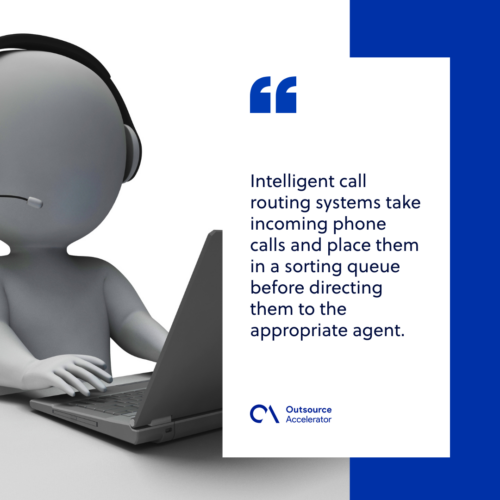Intelligent call routing
Definition
What is intelligent call routing?
Intelligent call routing systems take incoming phone calls and place them in a sorting queue before directing them to the appropriate agent.
The system maintains routing priorities based on logic provided by the systems’ chosen routing rules and criteria.
Traditional intelligent call routing systems were mandated, but its advanced systems incorporate artificial intelligence and machine learning algorithms for intelligent call routing.
If the agent is unavailable, intelligent call routing can choose another agent who can answer the queries. It does not only recognize the customer’s caller ID and pick-up information, it can also provide the client with a promotional offer based on his history and profile with the organization.
Additionally, intelligent call routing systems can connect callers to their previous agent they spoke with. This is useful in situations where a certain agent is already able to track the progress of the case. This way, the caller wouldn’t have to waste time repeating details that were already given.

How does intelligent call routing work?
Occasionally, a customer service agent will miss the actual intent of the caller. This creates a disconnection between different business units and dissatisfaction with customers due to unsolved problems.
An ICR system uses three types of data such as caller input, caller data, and historical data. Caller input is the collection of information provided by callers through voice or Interactive Voice Response (IVR).
These contain account information, the type of the inquiry, and the type of outcome. On the other hand, caller data refers to ICR’s phone number identification function through Automatic Number Identification (ANI) and Dialed Number Identification Service (DNIS).
It captures the caller’s phone number to compare it with the company’s database. Further, historical data refers to account standing, past purchases, support history, personal information, and sentiment data.
Each data is combined with the help of the intelligent call routing system to choose the appropriate agent for the caller’s concerns and needs. The system may also use voice recognition or provide callers with menu options to enter what services they require.
What are the benefits of intelligent call routing?
There are various benefits when using an intelligent call routing system such as:
Delivers the best customer experience
Calling an ICR-enabled call center enhances the probability that the caller will be connected with the agent that is best-suited to fulfill the call.
Time-saving
Intelligent call routing systems significantly minimize wasted payroll time by avoiding the high variety of situations in which callers are required to repeat their issue explanations to various agents before being connected to the person who can solve their problem.
Cost-effective
In high-volume call centers and other corporate operational environments, having an auto-attendant manage call routing reduces customer service expenses.
Increases agents’ ability to promote the brand
The information gathered through the intelligent call routing data collection process allows for deeper insights into consumers’ wider requirements as they relate to the company’s products and services.
This benefit improves agents’ capacity to offer quality service interactions with callers and create connections that promote the brand.
Reduce dissatisfaction
ICR systems give information to agents such as the caller’s history of engaging with customer service, account activity, and payment history which strengthens the agent and helps reduce possible inconveniences for client and agent. This increases employee satisfaction.
What are the strategies to improve customer service with intelligent call routing?
Ensures high-quality data
Call data is at the core of intelligent call routing. Even the greatest solution provider will be unable to implement an efficient intelligent call routing system if data quality concerns exist.
At the very least, data on call length, customer happiness, agent ID, and agent competence must be clear.
Evaluate and resolve connection concerns
To maintain and recruit consumers, providers are giving away their intelligent call routing systems for free since system integrations can be difficult and time-consuming.
Once you’ve decided to work with a provider, thoroughly examine integration concerns and resolve them immediately in the implementation process.
Monitor key performance indicators
In large customer call centers, there are several continuous process improvement and training activities. Attributing improvements to various efforts while maintaining accounting for seasonality and other market conditions is difficult and unrealistic.
Switching off the intelligent call routing system at random intervals and observing the increase due to intelligent routing is a reliable approach to assess the impact.
Maintain your attention on other initiatives
Even while intelligent call routing is crucial, it is one of the components of excellent customer service administration. Call center management is challenging, and several initiatives can be implemented.
Reducing calls by adopting self-service and reducing product problems, may be a more significant approach than optimizing routing. Intelligent call routing increases performance and the company’s goal of improving every agent’s performance remains constant.







 Independent
Independent




